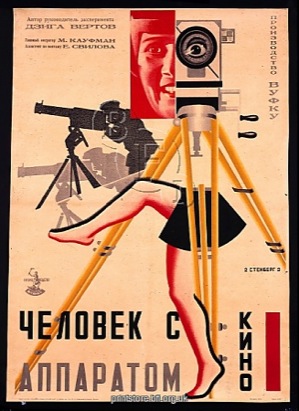
Director: Dziga Vertov
Writer: Dziga Vertov
I love watching films from the early years of cinema. Some of the most experimental films in the form's history date from this period; The Man With the Movie Camera is one of these. I found it utterly delightful. I must confess I didn't really clock the Marxist aspects of the film, which, considering the amount of vision of machinery efficiently working away, accompanied by images of happy, busy people exposes my sloppy viewing. However, this does show that The Man With the Movie Camera is enjoyable without engaging with its politics.
The film's self-reflexivity is one of its most charming aspects. We start with a cinema theatre filling up with an audience, welcomed by magical chairs that unfold invitingly. There are also several 'over-the-shoulder' shots of the camera filming the bustling city, and a lovely little sequence where the camera assembles itself and walks around.
The subject of this documentary is the cities of Moscow, Kharkiv, Kiev and Odessa and their residents, going about their daily lives. We see them rise in the morning, blinking their eyes against the sunlight like blinds on a window; going up buildings in lifts, and across town in trams. The tone is upbeat and celebratory, presenting the world of the everyday worker and their enjoyment of all aspects of life.
The film techniques employed by Vertov are many, and for me were not used as a gimmick. Vertov used double exposure to overlay an image of machinery with a a smiling female worker (how Marxist!); his tracking shots followed moving vehicles and (self-reflexively) his own camera perched on an open tram cart, immersing the viewer in the movement of the city.
This is a gorgeous documentary, one of the best in cinema history.
This gem is an amazing example of what the film media can do. It looks like they had a lot of fun making it and I get the feeling that the communist message was merely the pretext to allow them to explore the media. A bit like Riefenstahl's Olympia movies.
ReplyDeleteI love finding films from early on in cinema that show how experimental and playful people were with this new medium. I agree about the fun, especially travelling around on an exposed tram!
Delete